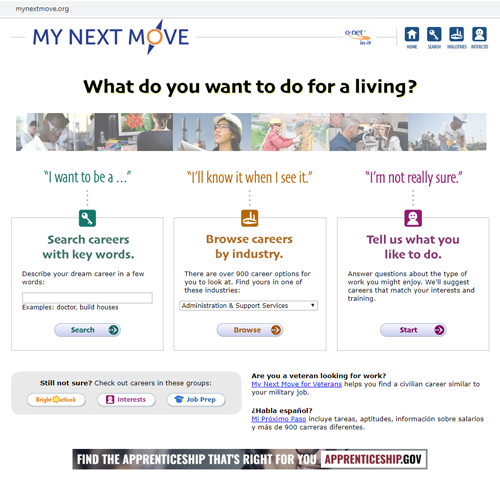What do you want to be when you grow up? Some of us know from the get-go exactly what we want to do, who we want to be. Some of us figure it out along the way. Some of us are still figuring it out. As parents, it’s an important question your child faces throughout school. Educating your child about job outlooks, salaries, skills, and education, you can help them make their own decisions and guide them to success.
To start off, take a look at MyNextMove.org.

The website is sponsored by the U.S. Department of Labor, Employment & Training Administration, and it provides all sorts of information about all kinds of careers. Together, you can sit down with your teen and walk through what interests them, and then find career options that might make a good fit. Ultimately, you want to talk through a variety of areas.
What the job entails
Lots of jobs sound interesting, but when you find out what the day-in-and-day-out actually include, your teen may want to pursue a different path. Above all, ensure your child truly understands what the job entails.
Knowledge needed
A nurse, for example, needs a different foundational knowledge than, say, a software programmer. If we’re looking at nurses again, they often need a strong healthcare background, along with basic business skills, some of the arts and humanities, and even some teaching or education.
Skillset needed
Consider some of the soft skills needed to do the job. For example, nurses must be organized, pay close attention to detail, and solve problems.
Abilities needed
Are you a good listener? Can you take direction well and remember what was said? What about multitasking, or even speaking a foreign language? Different abilities lend themselves to different careers.
Personality needed
This is a big one. Anyone can learn new skills or gain new knowledge, but the right personality for the right profession makes a huge difference. If your child is gregarious, creative, and social, a career where those personality traits are rare wouldn’t be a good choice.
Technology needed
Programmers may require expertise in several types of programming languages. Business managers may need to know office applications (e.g., Excel, PowerPoint). Know what kinds of technology you’ll be using in your new career can help your child start learning early.
Education needed
Make sure your child knows what kind, and what amount, of schooling is needed for different careers. Some professions require advanced degrees. Others do not. Your child may love healthcare but worry that all the extra schooling may not be for him. That doesn’t mean you rule out an entire field of study. Instead, find a path that works for his personality, knowledge, skills, and ability.
The costs of education
One of the big questions related to education is how you’re going to pay for it. Scholarships, student aid, and part-time jobs are all options. Know how much different schools charge for tuition. Talk about in-state vs. out-of-state options and costs. Ensure your child knows what it means to borrow for school, and discuss the plan for paying it back. Talk about the pitfalls of borrowing too much against a career path that will make it impossible to pay back. Take a look at this College Preparation Checklist at studentaid.ed.gov: https://studentaid.ed.gov/sa/sites/default/files/college-prep-checklist.pdf.
Job outlook
Some professions are projected to be in high demand in the coming years. Others are not. Know whether your child will be likely or unlikely to find a job in a certain field might help steer them to a successful educational and professional outcome.
Listen, listen, listen
We strongly encourage parents to take the time to listen to their child’s plans and ideas. Your job is to steer, not force, your child toward an education and profession that best suits their needs and likes. By listening and talking openly with your child, you provide the best chances for success.
Resources:
- https://www.mynextmove.org/
- https://www.bls.gov/careeroutlook/2015/article/career-planning-for-high-schoolers.htm
- https://www.usnews.com/education/best-colleges/slideshows/parents-10-ways-to-help-your-teen-with-the-college-decision?onepage
- https://www.usa.gov/higher-education
- https://www.schools.nyc.gov/school-life/learning/college-and-career-planning
- https://studentaid.ed.gov/sa/sites/default/files/college-prep-checklist.pdf

